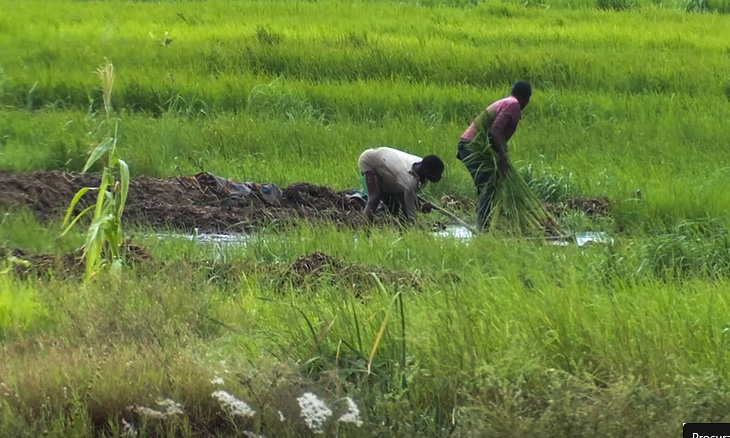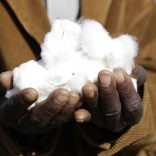Mozambique stops subsidizing cotton prices in current agricultural campaign
Greater Maputo: Residents turn a swamp into rice fields

Photo: O País
As a way out of the Covid-19 crisis, more than 60 farmers have taken to growing rice near the Maputo toll in Matola municipality. The harvest provides each farmer with between four to six bags of rice for domestic consumption.
It is a reality that goes unnoticed in the eyes of the municipalities of Maputo and Matola. Anyone who notices sees only people with hoes, and has no idea what has happened there.
Not so long ago, there were only hectares and hectares of reeds there, an image familiar to those who passed through by road or by rail. Today, the ‘caniçal’ [reed bed] has given way to small-scale rice production feeding more than 60 families.
They come from neighbourhoods like Magude, Trevo and Infulene, along National Road Number Four in Maputo province; people who found in rice production an alternative to unemployment.
“Hunger respects no one. I don’t work, but I have a family and children, and everyone needs to eat. When the government said that anyone who didn’t have work must grow, I chose rice,” Agy Albino, one of the farmers, says.
The 60-year-old is from Zambézia, and that was where he learned how to grow rice. He came to Maputo in search of better conditions, but when the Covid-19 pandemic broke out, he and his daughter lost their source of income. Left with no alternative, clearing the reeds to plant rice was the solution he found.
“We don’t know if it’s going to work, but we’ll produce to see how it goes,” Albino’s daughter says
It all started in February 2021, when some residents of the Trevo neighbourhood decided to cut down the reeds, which were tall and encouraged criminal activity. With the clean fields came the idea of seeing if rice would grow there, and it worked.
Gordino Pereira is also a farmer. He says that, at the beginning, he grew cabbage and other vegetables, but when people started growing rice in the area he decided to join in, and acquired a plot.
“Here, the reeds were high and there were bandits hiding in them, so we decided to cut them down. The neighbourhood secretaries managed the distribution of plots – we paid 1,000 meticais for a 50 by 30-metre space,” Pereira explained.
There are husbands and wives, fathers and daughters, widows; in short, a multitude of citizens from Zambézia, Nampula, Sofala and Gaza and other provinces, who did not find in the greater Maputo area the bonanza they were hoping for.
“Last year, I sold some sacks of bags. And I hope that, with this rain, I will get more. Here, we produce to eat, with the children here at home, given that my husband has no job,” Gina Emílio explained.
From plots of about 50 metres square, each producer manages to harvest, on average, four to six bags of rice. Most is intended for home consumption, but some are already thinking about trade.
Every day, more residents of these neighbourhoods decide to engage in rice production. Some of these “accidental farmers” are already thinking of increasing their production to supply local neighbourhoods in the near future.
By Inalcídio Uamusse












Leave a Reply
Be the First to Comment!
You must be logged in to post a comment.
You must be logged in to post a comment.